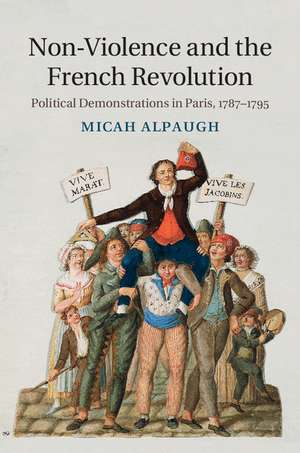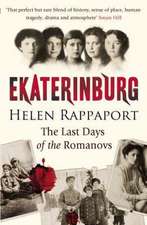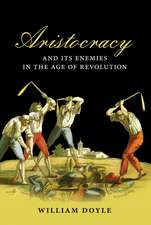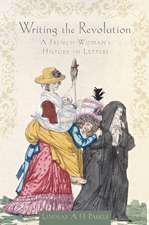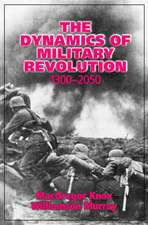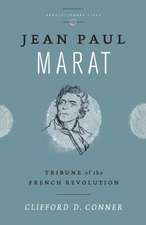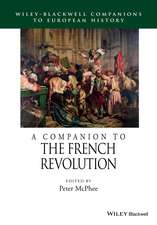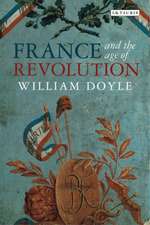Non-Violence and the French Revolution: Political Demonstrations in Paris, 1787–1795
Autor Micah Alpaughen Limba Engleză Hardback – 22 oct 2014
Preț: 695.39 lei
Preț vechi: 781.35 lei
-11% Nou
Puncte Express: 1043
Preț estimativ în valută:
133.06€ • 144.99$ • 112.12£
133.06€ • 144.99$ • 112.12£
Carte tipărită la comandă
Livrare economică 23 aprilie-07 mai
Preluare comenzi: 021 569.72.76
Specificații
ISBN-13: 9781107082793
ISBN-10: 110708279X
Pagini: 302
Ilustrații: 4 tables
Dimensiuni: 155 x 237 x 23 mm
Greutate: 0.55 kg
Editura: Cambridge University Press
Colecția Cambridge University Press
Locul publicării:New York, United States
ISBN-10: 110708279X
Pagini: 302
Ilustrații: 4 tables
Dimensiuni: 155 x 237 x 23 mm
Greutate: 0.55 kg
Editura: Cambridge University Press
Colecția Cambridge University Press
Locul publicării:New York, United States
Cuprins
Introduction; 1. Marching in Paris, from the Old Regime to the Revolution; 2. Political demonstrations and the politics of escalation in 1789; 3. From rapprochement to radicalism, 1790–1; 4. War, collaborative protest, and the 1792 Republican movement; 5. Fraternal protest in a time of terror, August 1792–September 1793; 6. Reasserting collective action: 1794–5; 7. Moderate and conservative marches in Revolutionary Paris; Conclusion; Appendix: Parisian protests, 1787–95; Bibliography; Index.
Recenzii
'Micah Alpaugh offers an important new perspective on the complex urban culture of eighteenth-century Paris, and on the French Revolution. Reading beyond the traditional narrative of violent confrontations, he shows us persuasively that such clashes were the exception rather than the rule, and that overt confrontation often came after the failure of authorities to respond to popular concerns expressed through the full panoply of a surprisingly modern culture of democratic engagement.' David Andress, University of Portsmouth
'An impressively researched book that transforms our understanding of eighteenth-century protest and of the revolutionary process in Paris. A major contribution to the history of the French Revolution.' David Garrioch, Monash University, Australia
'Non-Violence and the French Revolution challenges one of the central images of the French Revolution in the western imaginary. Micah Alpaugh shows us that the violent actions of the Parisian crowd need to be set in the context of a huge but largely hidden wave of popular protest and demonstration characterised essentially by non-violence. Placing the Parisian sans-culottes back at the centre of his analysis, this imaginative and striking study contributes significantly to a new social and political history of the Revolution.' Colin Jones, Queen Mary University of London
'Alpaugh gives us a fresh and compelling thesis about the essentially non-violent and almost continuous protest of the revolutionary years in Paris, a major contribution to our understanding of the roots of collective, participatory democracy.' Peter McPhee, University of Melbourne
'It is a well-researched book that deserves to be widely read and debated … this book is a fine contribution to historical writing on the political life of the streets in Paris during the French Revolution.' Mark Jones, European Review of History
'Alpaugh deploys his own impressive evidentiary base to portray protesters as rational actors experimenting with non-violent ways of participating in the political process, experiments that helped to shape contentious politics in the age of democratization.' Cynthia A. Bouton, American Historical Review
'Alpaugh's book is a compelling riposte to those who have conceptualised the Revolution as essentially violent: but it is also a passionate reflection, drawing on a vast range of sources, on key global questions of revolution in the eighteenth century and today. This book demonstrates that there are many ways to do global history: the Paris sections - so richly documented, and so frequently analysed by scholars over the past century - serve here as a microcosm for thinking about the emergence of contentious politics and popular participatory democracy, with global implications.' Ian Coller, French History
'Alpaugh has offered yet another empirical rebuttal to a thesis that has received disproportionate attention … [he] is to be commended for reminding us of the nonviolent nature and focused purposes of most Parisian political demonstrations during the Revolution.' Michael P. Fitzsimmons, The Journal of Modern History
'An impressively researched book that transforms our understanding of eighteenth-century protest and of the revolutionary process in Paris. A major contribution to the history of the French Revolution.' David Garrioch, Monash University, Australia
'Non-Violence and the French Revolution challenges one of the central images of the French Revolution in the western imaginary. Micah Alpaugh shows us that the violent actions of the Parisian crowd need to be set in the context of a huge but largely hidden wave of popular protest and demonstration characterised essentially by non-violence. Placing the Parisian sans-culottes back at the centre of his analysis, this imaginative and striking study contributes significantly to a new social and political history of the Revolution.' Colin Jones, Queen Mary University of London
'Alpaugh gives us a fresh and compelling thesis about the essentially non-violent and almost continuous protest of the revolutionary years in Paris, a major contribution to our understanding of the roots of collective, participatory democracy.' Peter McPhee, University of Melbourne
'It is a well-researched book that deserves to be widely read and debated … this book is a fine contribution to historical writing on the political life of the streets in Paris during the French Revolution.' Mark Jones, European Review of History
'Alpaugh deploys his own impressive evidentiary base to portray protesters as rational actors experimenting with non-violent ways of participating in the political process, experiments that helped to shape contentious politics in the age of democratization.' Cynthia A. Bouton, American Historical Review
'Alpaugh's book is a compelling riposte to those who have conceptualised the Revolution as essentially violent: but it is also a passionate reflection, drawing on a vast range of sources, on key global questions of revolution in the eighteenth century and today. This book demonstrates that there are many ways to do global history: the Paris sections - so richly documented, and so frequently analysed by scholars over the past century - serve here as a microcosm for thinking about the emergence of contentious politics and popular participatory democracy, with global implications.' Ian Coller, French History
'Alpaugh has offered yet another empirical rebuttal to a thesis that has received disproportionate attention … [he] is to be commended for reminding us of the nonviolent nature and focused purposes of most Parisian political demonstrations during the Revolution.' Michael P. Fitzsimmons, The Journal of Modern History
Notă biografică
Descriere
Challenging scholarly emphasis on French Revolutionary violence, this book instead examines the prevalence of peaceful, democratic methods in Parisian protest.
